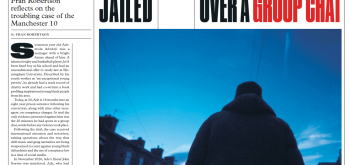Judicial review must be restricted. Not because it’s a bad thing, you understand. But because the economic imperative requires it – writes Ben McCormack. David Cameron’s argument is that business and development is being stifled because of the fact that meritless judicial review claims were being brought, usually unsuccessfully, stopping projects going ahead on time and harming the chances of recovery.
- Ben McCormack is a barrister at Garden Court North Chambers, where he specialises in housing, public law, discrimination and human rights. Before joining the bar, Ben was previously a specialist housing law solicitor and has over 15 years experience in this field.
Cameron told the CBI of a ‘massive growth industry’ of judicial reviews, which had ‘almost tripled over a decade’; many of them being ‘completely pointless’ and the cause of delay to major projects:
‘We urgently need to get a grip on this. So here’s what we’re going to do: reduce the time limit when people can bring cases, charge more for reviews so people think twice about time-wasting, and instead of giving hopeless cases up to four bites of the cherry to appeal, we will halve that to two.’
As was pointed out in the Guardian and elsewhere within hours of this speech, the rise in the number of applications for JR is mainly attributable to the increase in immigration and asylum litigation. The number of JRs in all other areas of law has remained broadly constant since the mid-1990s. And the kind of challenges that relate to large scale development account for a very small proportion of the total. But, of course, the proposed changes will apply across the board – there being no suggestion that these reforms would be somehow targeted at the perpetrators of unreasonable delays to the kind of worthy, growth inducing business projects that the government would consider were in the national interest.
Instead, the economic imperative was offered as a justification for a large-scale incursion in the rights of citizens (and often poor, disadvantaged and vulnerable citizens at that) to hold government to account.
This would not be the first government to feel frustrated at the fact that it is unable to do exactly as it wishes because, on occasion, a citizen persuades the courts that it is acting unlawfully. But the occasional loss in court – and perhaps too a loss of political face – is, as the late Lord Bingham pointed out (in The Rule of Law) an inescapable consequence of living in a state governed by the rule of law. Unable to effectively legislate away many of the core principles of public law or human rights, this government seems instead intent on trying to make judicial review as procedurally difficult for its citizens as is possible – so that less of them think about trying it in the first place. Access to the courts is however a fundamental constitutional right.
And Cameron’s recent announcements must be seen together with the massive restriction on the availability of legal aid coming down the line next year. Proposed regulations being debated in early December the effect of which would be to restrict legal aid from even more JR cases than presently anticipated by application of a strict requirement to exhaust all possible alternative routes of challenge before funding could be granted.
That said it will be interesting to see just how the tightening of the JR limitation period will be achieved. It already requires claims to be brought ‘promptly’ and in any event no later than three months after the making of the decision under challenge. What will follow – will claims have to be brought with alacrity? With haste? ASAP?
Box ticking stuff
Also in the line of fire are Equality Impact Assessments. Cameron again:
‘We have smart people in Whitehall who consider equalities issues while they’re making the policy. We don’t need all this extra tick-box stuff. So I can tell you today, we are calling time on equality impact assessments. You no longer have to do them if these issues have been properly considered.’
The EIA is simply a tool by which a decision-maker or policy-maker checks that the statutory equality duty on public authorities (now section 149, Equality Act 2010) is complied with. A formal assessment need not be carried out in every case in order to demonstrate compliance. It is avowedly not a ‘tick box exercise’ and anyone who thinks it is simply doesn’t understand the law properly. In one of the earliest cases brought on the public sector equality duty (regarding the closure of post offices and the effect thereof on disabled people) the court held that the duty must be exercised ‘in substance, with rigour and with an open mind’ – and the mere ticking of boxes was very much discouraged. The whole point of section 149 is not to mandate a particular outcome, but to effect the brighter illumination of the characteristics of particularly disadvantaged individuals and groups, at the point at which policy is formulated or relevant decisions made. Without repealing section 149 (which does not presently appear to be on the agenda) it is hard to see what the abolition of the need to carry out an EIA on a particular form can achieve.
Most troubling about this is the idea that government (via its ‘smart’ civil service) can be trusted to decide everything in a beneficent manner, and always in accordance with the law.
Tell that to the disabled residents of Birmingham, or the Isle of Wight, who had to go to court to have it declared that their local authorities’ decisions to restrict care provision only to ‘critical’ cases were unlawful. Or to the homeless young mother who had to bring a judicial review to overturn her local authority’s decision that it did not have to give her and her children her a temporary home in a hostel. Or even the very large multinational who lost out to another very large multinational in a competition to run a railway, and had to go to court to force the government to run that competition again. In each case – not so smart.
There will always be a proportion, perhaps a majority, of legal challenges to government action which fail. But there are thousands of successful examples each year. Many in fact settle, in the claimant’s favour, prior to permission even being granted. Many more settle after that hurdle is overcome. These are often the cases brought by individuals, and often in connection with a decision that affects only them or a small number of others.
This latest assault on the rule of law is poorly conceived, badly targeted and inadequately evidenced. Anyone concerned about it ought to ensure they engage with the consultation process upon it which the Ministry of Justice (no doubt through gritted teeth) now intends to embark. But be quick – in order to better facilitate our economic recovery you may only have a few days to offer your expert views on these proposals.









A detailed critique of the Court of Appeal judgment in the case of Oliver Campbell